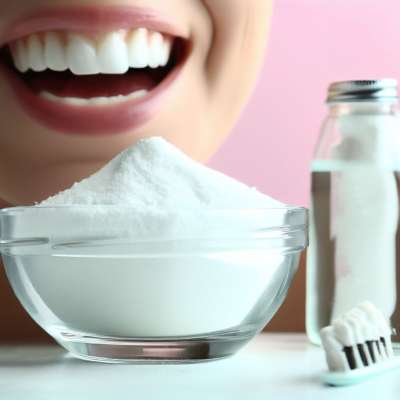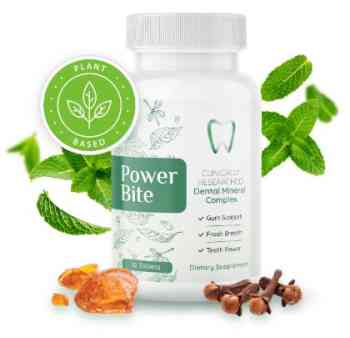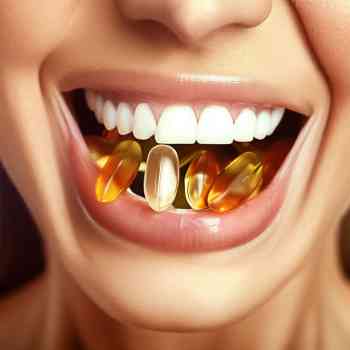Balancing Benefits and Risks: A Deep Dive into the Question – Is Baking Soda Good for Teeth and Gums?

Is baking soda beneficial for dental health? This age-old question has sparked discussions among dental professionals and home remedy enthusiasts. Delving into scientific studies and anecdotal evidence, we will explore the pros and cons of using baking soda for teeth and gums. While some advocate its natural whitening properties, others warn of potential risks. By the end of this article, you’ll have a clearer understanding of baking soda’s place in oral care.
Disclaimer
While an AI-generated the initial content of this article, it has been reviewed and edited by the author of this website for clarity and accuracy. The author has not personally tested any products mentioned and is not a licensed doctor or dental care expert. The information provided should not be considered professional medical advice. Always consult a dental or medical professional before deciding about your health.
I. Introduction
The journey of baking soda, scientifically known as sodium bicarbonate, from our kitchen shelves to our bathrooms is as old as time. This versatile ingredient, celebrated for its myriad uses, has entered many oral care routines.
A. Historical use of baking soda in dental care
Long before the advent of modern toothpaste, baking soda made its mark in dental care. Indigenous cultures recognized its cleansing properties and utilized it as a rudimentary toothpaste, often just by dipping a damp finger or cloth into the powder and rubbing it on their teeth. Not only did this provide a means to clean the teeth, but it also offered a form of mild abrasion that helped remove stains and plaque.
B. Current popularity and trends
Today, baking soda in dental care has surged in popularity, especially amidst the natural and organic product movement. It’s not uncommon to find toothpaste brands touting baking soda as a primary ingredient, and DIY toothpaste recipes often include it as a staple. The appeal? It has a reputation for being a natural, effective, and cost-efficient solution for various dental concerns.
II. The Benefits of Baking Soda for Oral Health
The reasons for integrating baking soda into one’s dental regime are varied and compelling.
A. Natural whitening properties
One of the foremost attractions of baking soda is its natural whitening ability. Baking soda offers a gentler approach than many commercial whitening agents that might contain harsh chemicals. Its mildly abrasive nature helps scrub away surface stains on teeth, which can lead to a brighter smile over time.
B. Ability to neutralize oral pH and combat bad breath
Oral health is not just about white teeth; it’s also about maintaining a balanced environment in the mouth. Baking soda is alkaline, which can help neutralize the acids harmful bacteria produce. By keeping the pH levels balanced, baking soda aids in preventing tooth decay and can also be a remedy for bad breath, as it targets the underlying acidic environment where odor-causing bacteria thrive.
C. Low cost and easy accessibility
In an age of pricey dental care products, baking soda emerges as an economical alternative. Available in nearly every grocery store and found in most households, its accessibility and low cost make it a favored choice for many seeking affordable dental care solutions.
III. The Concerns and Risks
While baking soda has its benefits, it’s also essential to be aware of its potential drawbacks as a primary dental care ingredient.
A. Potential abrasiveness and its effects on enamel
The same abrasive quality that makes baking soda effective in removing surface stains can also pose risks. Extended and aggressive use of baking soda can lead to the wearing away of the tooth enamel, our teeth’s protective layer. Once eroded, enamel does not regenerate, leading to increased sensitivity and susceptibility to cavities and decay.
B. Possible imbalance of oral microbiome
The mouth is home to a complex ecosystem of bacteria, some beneficial for oral health. While baking soda can neutralize harmful acids, there’s a concern that overuse could also disrupt the natural balance of this microbiome. This imbalance might lead to unforeseen dental issues or exacerbate existing ones.
C. Warnings from dental professionals
Many dentists and oral health professionals advise caution when using baking soda consistently. They emphasize that while occasional use might be beneficial, making it a primary dental care agent without professional oversight can have detrimental effects. Following professional guidelines and recommendations ensures the safe integration of baking soda into one’s oral health routine.
IV. Comparative Analysis
Understanding where baking soda stands in dental care is essential to see how it measures against conventional methods and products.
A. Baking soda vs. conventional toothpaste
While baking soda offers a natural cleaning method, most commercial toothpastes contain fluoride, a mineral known to prevent tooth decay and strengthen enamel. Baking soda, on its own, doesn’t provide these fluoride benefits. Moreover, many toothpastes are formulated to be non-abrasive, ensuring a gentle clean without risking enamel damage.
B. How often and in what quantities should it be used?
Moderation is key for those keen on integrating baking soda into their dental regimen. Many experts recommend limiting its use to once or twice a week and ensuring it’s adequately diluted. Creating a paste with a 2:1 ratio of baking soda to water can ensure it’s gentle enough for most users.
C. Best practices for safe application
To derive the benefits without the risks, it’s crucial to apply baking soda carefully. Gentle circular motions while brushing prevent undue abrasion. Following up with a fluoride mouthwash can also help offset enamel erosion and fortify teeth. Always consult a dental professional before significantly changing your oral care routine.
V. Testimonials and Real-world Experiences
When exploring the effects of baking soda on dental health, it’s invaluable to consider the experiences of those who’ve incorporated it into their routines.
A. Personal stories of those who advocate for baking soda use
Mara, a 28-year-old yoga instructor, swears by her bi-weekly baking soda brushing routine. “I’ve always been drawn to natural remedies, and baking soda was no exception. Over the past year, my teeth look brighter, and my breath feels fresher.”
Tom, a 45-year-old writer, recounts, “My grandmother introduced me to baking soda as a tooth cleaner. I’ve used it intermittently for over two decades now. While I use regular toothpaste daily, I believe baking soda has played a role in keeping my teeth stain-free.”
B. Experiences of those who faced negative consequences
On the flip side, not all experiences have been positive. A 33-year-old banker, Jenna, shares, “I started using baking soda daily, thinking it would be a better alternative. Within months, my teeth became noticeably sensitive. My dentist pointed out that the enamel had worn down in certain spots.”
Alex, 40, echoed a similar sentiment: “I switched to a homemade baking soda toothpaste. While it did whiten my teeth, I also developed painful sores in my mouth. A specialist informed me that I had disrupted my oral pH balance.”
C. Expert opinions and recommendations
Dr. Lillian Hughes, a dentist with over 15 years of experience, opines, “Baking soda can be a great supplementary dental care product when used judiciously. However, relying solely on it and forgoing other essential elements like fluoride can be detrimental.”
Dr. Aaron Mitchell, an oral surgeon, adds, “I’ve seen cases where overenthusiastic use of baking soda has led to enamel erosion. I would advise always seeking guidance from a dental professional before making it a regular part of your routine.”
VI. FAQs
Q: Can baking soda replace my regular toothpaste?
A: No, while baking soda has cleaning properties, regular toothpaste contains other beneficial ingredients like fluoride, which baking soda lacks.
Q: How often should I use baking soda to brush my teeth?
A: Many dental professionals recommend using baking soda at least once or twice weekly.
Q: Is baking soda safe for sensitive teeth?
A: Baking soda is abrasive and can exacerbate sensitivity. If you have sensitive teeth, consult with a dentist before using it.
Q: Does baking soda help with gum health?
A: Baking soda can neutralize harmful acids, potentially benefiting gum health. However, overuse can disrupt the oral microbiome and could harm the gums.
Q: Can children use baking soda for brushing?
A: Baking soda can be abrasive for young, developing teeth. It’s best to consult a pediatric dentist before introducing it to a child’s oral care routine.
Q: Will baking soda erode my tooth enamel?
A: Excessive or aggressive use of baking soda can wear down tooth enamel. It’s crucial to use it in moderation and preferably diluted form.
Q: Is it okay to use baking soda daily for oral care?
A: Most experts advise against daily use due to its abrasive nature and potential to disrupt the mouth’s natural balance. It’s best to use it sparingly and always consult with a dental professional.
VII. Conclusion
As we draw our exploration to a close, it becomes evident that while baking soda holds a certain allure in oral care, it isn’t without its caveats.
A. Weighing the pros and cons
The merits of baking soda are evident—its natural whitening properties, ability to neutralize oral pH, and cost-effectiveness make it a compelling choice for many. However, the potential risks of enamel erosion, disruption of the oral microbiome, and the cautions raised by dental professionals can’t be overlooked.
B. Making an informed decision about using baking soda for teeth and gums
Incorporating baking soda into your dental care routine refers to individual preferences and needs. Those seeking natural alternatives and occasional whitening might find baking soda beneficial. But it’s pivotal to approach its use with moderation and care. It is essential to recognize that it cannot wholly replace conventional toothpaste but can instead complement it.
C. Encouraging further research and consultation with professionals
Before integrating any new substance or routine into one’s oral care regimen, it’s imperative to do thorough research. While testimonials and articles can provide insights, personal consultation with a dental professional is invaluable. They can offer tailored advice based on your specific dental health and needs. In the quest for a brighter smile and healthier mouth, informed decisions backed by expert opinions will always lead the way.
VIII. Suggested Readings
For those intrigued by baking soda’s potential benefits and uses for oral health, diving deeper into the topic through further reading can offer valuable insights. Here are some recommended books that delve into this subject and the broader arena of natural dental care:
- The Baking Soda Magic Kill Tooth Decay by Lum Arifi (2023)
Delve into this book to thoroughly understand how baking soda can be a game-changer for oral health. Arifi meticulously details the benefits, from bacteria elimination to teeth whitening, while ensuring readers know the safest ways to utilize this common household item. - Baking Soda: The Secret to At-Home Dental Care by Dr. Joseph Mercola (2018)
Dr. Mercola, a prominent advocate for natural health, explores the multifaceted uses of baking soda in dental care. From acting as a toothpaste substitute to its role in mouthwash solutions, this book provides many insights backed by professional knowledge. - The Natural Dentist: A Comprehensive Guide to Natural Therapies for a Healthy Mouth and Body by Dr. Joseph Green (2012)
Dive into the world of natural dentistry with Dr. Green. Along with discussing baking soda’s role in oral health, this guide widens the lens to encompass a range of natural therapies tailored for a healthier mouth and body. - Natural Remedies for Oral Health: A Complete Guide to Preventing and Treating Common Dental Problems by Dr. Susan Blum (2010)
Dr. Blum sheds light on the myriad of natural solutions available for dental care. Whether you’re curious about baking soda’s efficacy or other holistic remedies, this book is an extensive guide. - The Complete Book of Home Remedies: Over 3,500 Remedies for Common Ailments and Conditions by Rodale Press (2007)
A treasure trove of home remedies, this comprehensive book covers an array of health concerns. Those specifically interested in oral health can find a dedicated section on baking soda remedies, providing readers with practical recipes and guidelines.
Arming oneself with knowledge is crucial, especially when considering the introduction of new methods or products into one’s healthcare routine. Each book allows readers to make informed decisions based on extensive research and expert opinions.





